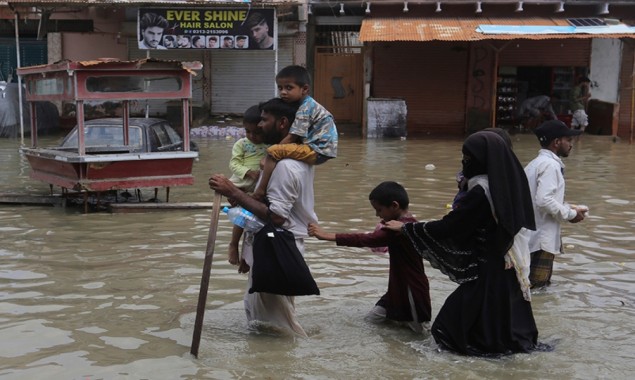
monsoon rain karachi
Citizens demand that encroachments be removed and nullahs be cleared before monsoon rains to avoid the same fate as last year.
Last year’s monsoon rain wreaked havoc in Pakistan taking at least 100 lives and affecting millions others across the country. But the country’s financial capital suffered the worst of all forcing Prime Minister of Pakistan Imran Khan and the Chief of Army Staff General Qamar Bajwa to rush to Karachi and take a slew of emergency measures.
The heavy downpour in Karachi brought life to a standstill with streets and homes flooded with rain and sewage water.
Hundreds were left stranded in the city after streets turned into rivers owing to the dilapidated and ill-maintained drainage systems.
Prime Minister announced Rs1.1 trillion emergency package to improve city’s fragile sewage and drainage system as well as widening the heavily encroached nullas.
While thousands suffer from the Supreme Court’s recent orders to remove encroachment along the Orangi and Gujjar nullahs, the directive to widen the two major nullahs of the city will help lessen the impact of urban flooding—saving both lives and infrastructure of the megacity.
“Last years’ experience was a nightmare, I could not get home because of the flooded streets after they were inundated with sewage water owing to the choked nullahs,” remembers Faisal Memon.
He recalls that the main road near Gujjar Nullah in Nazimabad was completely submerged where he and many other motorcyclists like him spent the night stranded.
Memon demanded that the government speed up its cleanliness drive of the city’s nullahs before the onset of the monsoon season so that people don’t have to go through the same fate as last year.
The city’s major natural drains, including the Gujjar, Orangi, Sukhan and Thaddo nullahs, carry sewage to the sea every day. The sewage arrives into these nullahs from 18 smaller drains that span across the city. There are 11 underpasses and 106 roads that are considered most vulnerable during monsoon season.
Last year, the government allocated Rs22 million to remove the sludge from nullahs, however, a year on nothing much has been done to that effect.
An anti-encroachment drive on the directives of the Supreme Court is under way to widen the Orangi and Gujjar nullahs by 30 feet.
According to the survey conducted by NED University, Gujjar Nullah needs to be brought back to its original shape on an urgent basis to the right-of-way (ROW) for passage of water before the rain.
In 2020 the local government department along with Sindh Solid Waste Management Board (SSWMB), KMC, six district municipal corporations and National Disaster Management Authority (NDMA) under a $100 million World Bank programme had cleared three major nullahs in the city — Gujjar, Korangi and Mowach Goth nullah — and removed 4.3 million cubic feet sludge from these drains.
These nullahs, however, are clogged again due to failure of city’s civic bodies or Sindh government’s lenient attitude.
As a routine practice, the city administration has issued press statements claiming that an emergency plan has already been materialised.
The Karachi administrator has directed his subordinates to make all necessary arrangements for monsoon rains before the start of the rainy season, so that any emergency situation could be dealt with in a timely and efficient manner.
Also Read
Read More News On
Catch all the Pakistan News, Breaking News Event and Latest News Updates on The BOL News
Download The BOL News App to get the Daily News Update & Follow us on Google News.




